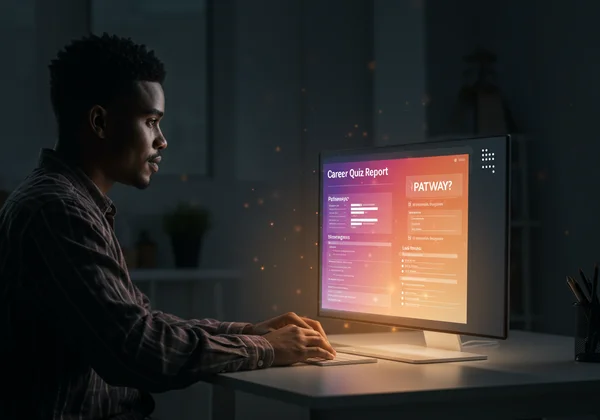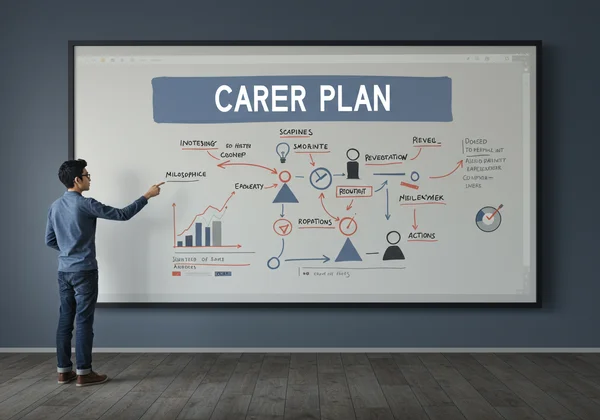Career Quiz Results: 7 Actionable Steps for Your Path
You’ve just completed a career quiz, and now you’re staring at a list of potential professions, strengths, and personality traits. It’s an exciting moment, but it often comes with a big question: What’s next? For many students, job seekers, and professionals considering a change, this initial burst of clarity can quickly be followed by confusion. How do you transform these valuable insights into a real, tangible career plan?
Don't let your momentum fade. Your career assessment results are not the finish line; they are the starting point of an empowered journey. This guide provides seven actionable steps to help you translate your personalized results into a confident path forward. If you haven't taken a test yet or want to refresh your insights, you can take the quiz on our homepage to get started.

Understanding Your Career Assessment Results
Before you can take action, you need to fully grasp the information in front of you. A quality career test provides more than just job titles; it offers a mirror to your professional self. Taking the time to properly analyze your results is the most critical first step in your career exploration.
Step 1: Deciphering Your Personalized Career Quiz Report
Your report is a data-rich profile of your professional inclinations. Start by breaking it down into its core components. Look for sections detailing your key personality traits, workplace strengths, potential challenges, and core values. On our platform, our AI-enhanced reports are designed to give you deep, personalized insights that go beyond generic advice.
Pay close attention to the language used. Do the suggested roles align with words like "analytical," "creative," "collaborative," or "independent"? These descriptors are clues to the type of work environment where you’ll thrive. The goal isn't just to find a job title but to understand the underlying characteristics of a career that truly fits you.
Step 2: Reflect and Validate: Does Your Report Resonate?
A career quiz is a scientifically-backed tool, but you are the ultimate expert on yourself. Step two is to hold your results up against your own life experience. Does the report’s description of your strengths match the feedback you've received from teachers, managers, or peers? Do the suggested career paths spark a genuine sense of curiosity or excitement?
Make a list of the findings that feel spot-on and any that seem surprising. Don't dismiss the surprises—they might reveal a hidden talent or an unexplored interest. This validation process builds confidence in the results and ensures your next steps are grounded in both data and self-awareness. It's a key part of answering the question, "how to decide on a career?"

Turning Insights into Action After Your Career Quiz
With a solid understanding of your report, it’s time to move from reflection to exploration. This phase is all about gathering real-world information to see how your profile matches up with actual careers. This proactive research transforms abstract ideas into concrete possibilities.
Step 3: Exploring Matching Career Paths and Industries
Your quiz likely suggested several career paths. Now, it's time to become a detective. For each promising role, start your research. Look into the daily responsibilities, required education or training, salary expectations, and long-term industry outlook. Websites like LinkedIn and the Bureau of Labor Statistics Occupational Outlook Handbook are excellent resources for this.
Focus on more than just the job description. Read articles, watch "day in the life" videos, and explore companies in that industry. This deeper dive will help you visualize yourself in the role and determine if the reality aligns with your expectations. This is a crucial part of your career exploration, powered by the initial guidance from an online career test.
Step 4: Informational Interviews: Learning from the Pros
Reading about a career is one thing; talking to someone who lives it is another. Informational interviews are casual conversations with professionals working in fields that interest you. This is one of the most powerful and underutilized tools in career planning. It gives you firsthand knowledge you can’t find online.
Reach out to people on LinkedIn or through your personal network. Ask them about their journey, what they love about their job, and what challenges they face. Most people are happy to share their experiences and offer advice. These conversations provide invaluable context and can help you confirm whether a particular career path is the right fit for your personality and goals.

Implementing Your Career Planning Steps Effectively
Once you have a clearer picture of one or two promising career paths, the final stage is to create a structured plan to get there. This is where you build the bridge between where you are now and where you want to be.
Step 5: Identifying & Developing Necessary Skills
Compare the skills required for your target career with the strengths identified in your career assessment. Where do you align perfectly? Where are the gaps? This skill gap analysis is your blueprint for personal and professional development.
Create a plan to acquire any missing skills. This could involve taking online courses, earning a certification, volunteering for a relevant project, or even pursuing a new degree. Focusing on skill development not only makes you a more qualified candidate but also builds the confidence needed to pursue a new direction. Your career aptitude test results can be a fantastic starting point for building your resume.
Step 6: Crafting a Flexible Career Action Plan
An action plan turns your intentions into a roadmap. It doesn’t need to be complicated. Start with your long-term goal (e.g., "Become a Graphic Designer in two years") and work backward, setting smaller, achievable milestones.
Your plan might include:
- Short-term goals (1-3 months): Complete an introductory design course, conduct three informational interviews.
- Medium-term goals (6-12 months): Build a portfolio of five projects, network at two industry events.
- Long-term goals (1-2 years): Apply for internships or entry-level positions.
Remember to keep your plan flexible. The professional world is always changing, and your goals may evolve as you learn more.

Step 7: Networking and Seeking Mentorship
No one succeeds alone. Consistently building your professional network is essential. Attend industry events (both online and in-person), join relevant professional groups, and stay active on platforms like LinkedIn. Networking isn't just about finding a job; it's about learning from others and building a community of support.
Beyond broad networking, seek out a mentor—someone who is a few steps ahead of you in your desired field. A mentor can provide personalized guidance, act as a sounding board, and help you navigate challenges. Their experience can accelerate your growth and help you avoid common pitfalls on your journey.
Your Journey Begins: Empowered Career Decisions
Your career quiz results are a powerful catalyst for change, but the real transformation happens when you take these actionable steps. By understanding your report, exploring your options, and building a strategic plan, you move from uncertainty to empowerment. You are now in the driver's seat, equipped with the clarity and confidence to build a fulfilling professional life.
Ready to take that first step or dive deeper into your personalized insights? Start Your Career Quiz today and begin your journey toward a career you love.
Frequently Asked Questions About Career Quiz Results
Are Career Quizzes Actually Accurate?
Yes, when they are scientifically designed. Reputable career quizzes, like the one we offer, are based on established psychometric principles and career theories. While no quiz can predict the future with 100% certainty, they are highly accurate at identifying your core interests, values, and personality traits to suggest well-aligned career paths. Think of it as a reliable compass, not a GPS.
How Do I Find a Career I Truly Love?
Finding a career you love is a process of combining self-discovery with real-world exploration. Start with a tool like our free career quiz to understand your foundational strengths and interests. Then, use the steps outlined above—research, informational interviews, and skill-building—to test those findings in the real world. Passion often grows from engaging in work that aligns with your values and allows you to use your natural talents.
Is Our Career Quiz Really Free to Take?
Absolutely. We believe everyone deserves access to quality career guidance. You can take our complete career assessment and receive a free summary report that provides valuable insights and career matches. For users who want an even deeper analysis, we also offer an optional, enhanced AI-powered report that includes a detailed action plan, strengths, and challenges for a small fee.
What Kind of Report Will I Get from Your Career Quiz?
After completing our quiz, you will receive a personalized report detailing your career profile. The free summary includes your primary career type and a list of matching job suggestions to kickstart your exploration. The optional detailed AI report provides a comprehensive analysis, including an in-depth look at your strengths and weaknesses, actionable advice for career growth, and a personalized plan to help you move forward with confidence.